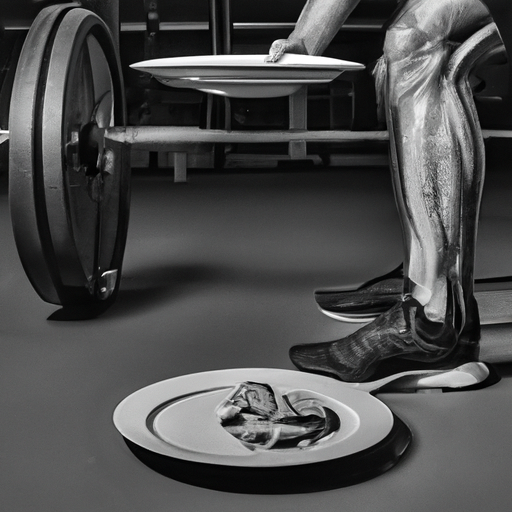In the world of fitness and bodybuilding, gaining muscle mass and building strength are two fundamental goals. However, achieving these goals requires more than just hitting the gym and lifting weights. It requires a comprehensive approach that includes both a proper diet and effective strength training techniques. This article will delve into the importance of diet for muscle gain and strength training, exploring the key nutrients and dietary strategies that can maximize muscle mass. Additionally, it will provide insights into effective workout plans and training techniques that can complement your diet, helping you reach your desired fitness goals. Whether you are a beginner or a seasoned athlete, understanding the basics of diet and strength training is crucial for achieving optimal results. So, let's dive into the world of muscle gain and strength training, and discover the key components that can help you transform your physique and enhance your overall fitness levels.
1. "Understanding the Basics: The Importance of Diet for Muscle Gain and Strength Training"
Understanding the Basics: The Importance of Diet for Muscle Gain and Strength Training
When it comes to gaining muscle mass and excelling in strength training, diet plays a vital role in achieving optimal results. While exercise is crucial for building muscle and increasing strength, without a proper diet, your efforts may not yield the desired outcomes. In this section, we will delve into the importance of diet in muscle gain and strength training, highlighting the key factors that contribute to success.
To begin with, it is essential to understand that muscles require fuel to grow and repair themselves. This fuel comes primarily from the nutrients we consume in our diet. Protein, in particular, is the building block of muscle tissue and acts as the foundation for muscle growth. Consuming an adequate amount of protein is crucial in promoting muscle protein synthesis, which is the process that stimulates muscle growth and repair.
In addition to protein, carbohydrates are another important component of a muscle-building diet. Carbohydrates provide the energy necessary for intense workouts and replenish glycogen stores in the muscles. By ensuring an adequate intake of carbohydrates, you can optimize your performance during strength training sessions, leading to improved muscle gains over time.
Furthermore, healthy fats should not be neglected in your diet. They play a significant role in hormone production, including testosterone, which is essential for muscle growth and strength development. Including sources of healthy fats, such as avocados, nuts, and olive oil, can contribute to overall muscle gain and enhance strength training results.
Apart from macronutrients, it is also important to pay attention to the intake of micronutrients.
2. "Fueling Your Muscles: Key Nutrients and Dietary Strategies for Maximizing Muscle Mass"
Fueling Your Muscles: Key Nutrients and Dietary Strategies for Maximizing Muscle Mass
When it comes to gaining muscle mass and improving strength through training, it is essential to pay attention not only to your workout routine but also to your diet. Proper nutrition plays a crucial role in providing the necessary fuel and building blocks for muscle growth and recovery. Here are some key nutrients and dietary strategies to optimize your muscle-building potential.
1. Protein: The Building Block of Muscles
Protein is often called the building block of muscles, and for a good reason. It is composed of amino acids, which are essential for muscle repair and growth. Including high-quality protein sources in your diet such as lean meats, poultry, fish, eggs, dairy products, legumes, and tofu is vital. Aim for about 1.2 to 2.0 grams of protein per kilogram of body weight daily to support muscle protein synthesis.
2. Carbohydrates: Fuel for Intense Workouts
Carbohydrates are the primary source of energy for your muscles during intense workouts. They provide the fuel needed for your muscles to perform optimally and aid in recovery. Opt for complex carbohydrates like whole grains, fruits, vegetables, and legumes as they provide a steady release of energy. Aim for about 45-65% of your daily calorie intake to come from carbohydrates, depending on your activity level and goals.
3. Healthy Fats: Enhancing Muscle Recovery
While protein and carbohydrates are often in the spotlight, healthy fats should not be overlooked. They play a crucial role in hormone production,
3. "Building Strength: Effective Workout Plans and Training Techniques to Complement Your Diet"
Building Strength: Effective Workout Plans and Training Techniques to Complement Your Diet
To achieve optimal results in gaining muscle mass, it is essential to combine a well-designed diet with an effective workout plan and training techniques. While a balanced and nutritious diet provides the necessary nutrients for muscle growth, strength training exercises help stimulate muscle fibers, promote hypertrophy, and enhance overall strength. In this section, we will explore some key aspects of building strength and outline effective workout plans and training techniques to complement your diet.
1. Resistance Training:
Resistance training forms the foundation of any muscle-building program. It involves exercises that work against an external force, such as weights, resistance bands, or bodyweight. By continuously challenging the muscles, resistance training promotes muscle breakdown, triggering the body's adaptive response to repair and rebuild stronger muscle fibers.
To maximize muscle growth, it is crucial to vary your exercises and target different muscle groups. Compound exercises, such as squats, deadlifts, bench presses, and overhead presses, engage multiple muscle groups simultaneously, making them highly effective for building overall strength. Additionally, incorporating isolation exercises, such as bicep curls or tricep extensions, can help target specific muscle groups for balanced development.
2. Progressive Overload:
Progressive overload is a fundamental principle in strength training. It involves gradually increasing the demands placed on the muscles to continually challenge them and stimulate growth. This can be achieved by progressively increasing the weight lifted, the number of repetitions performed, or the intensity of the exercise.
To implement progressive overload effectively, it is essential to track your progress and consistently push yourself to

